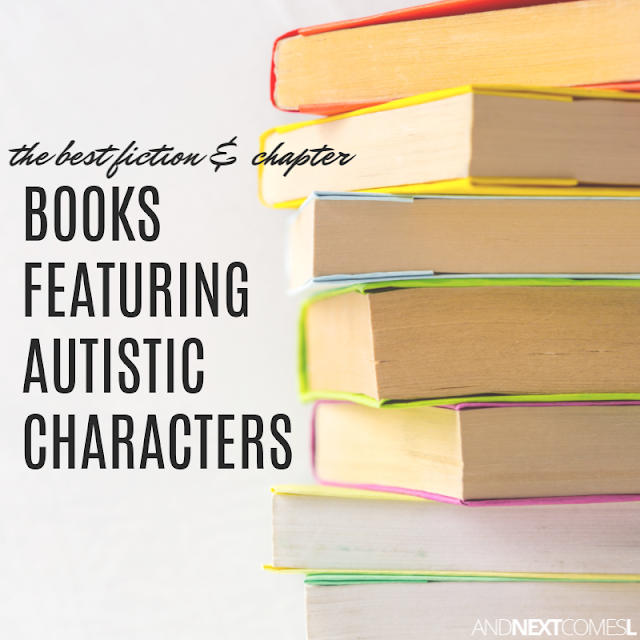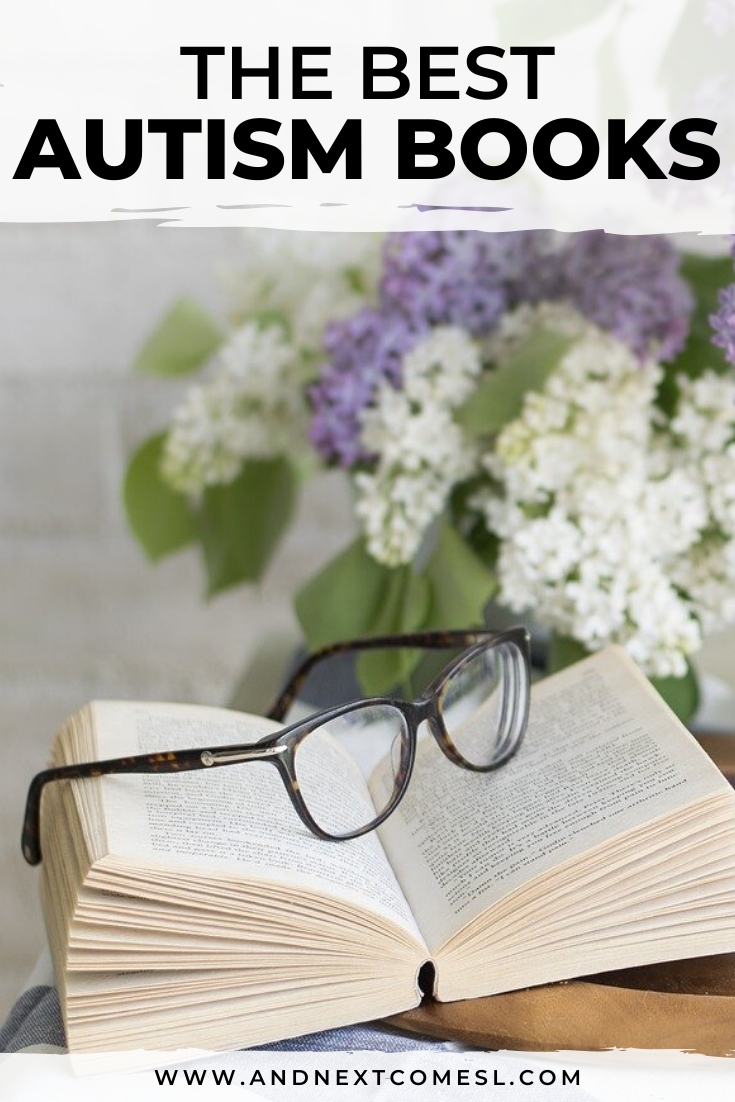This list of autism books is perfect for parents of autistic children to learn more about how their child sees the world around them.
Even before my son was diagnosed with autism, I did a lot of reading about the diagnosis, either in the form of research or personal blog posts. But I absolutely prefer reading a physical book about the topic. In fact, I usually have a stack of four or five books about autism on my nightstand, just waiting for me to read. However, I end up reading one and then adding at least two more to the pile. So I don't see my tower of autism books decreasing any time soon.
There's just always so much to read and learn about when it comes to autism.
Thankfully, I can help narrow down your reading list by providing you with the absolute best books about autism. These books are my favorites and I hope they will become some of your favorites too.
Some are short and insightful. Some are long and detailed. Some will give you practical solutions to help your autistic child grow and thrive.
But all of these autism books are worth reading.
Sometimes more than once.
These books are meant to inspire you, help you learn more about autism, give you insight into autism from an autistic person's perspective, and to help your children learn about their own autism.
Please note that this list will be edited and added to as I discover, read, and approve of new books about autism. I have only shared those that I have personally read and that I have found helpful, interesting, and informative. I have also decided to leave books about sensory issues off of this list. You can see the list of sensory processing books here. Otherwise, the list of books would get pretty lengthy!
Best Books About Autism: You're Going to Definitely Want to Read These!
1. The Reason I Jump: The Inner Voice of a Thirteen-Year-Old Boy with Autism
By Naoki Higashida
This book is an absolute favorite of mine when it comes to understanding autism. The insight that this book provides is fabulous and it definitely changed how I view and understand autism. Highly recommend it! Plus, it's a quick read and you can definitely read it from front to back in just a couple of hours.
2. Uniquely Human: A Different Way of Seeing Autism
By Barry M. Prizant
This book is just wonderful! It will definitely make you rethink how you see autism. A must read for everyone, whether or not you know or work with someone who has autism. If you only have time to read one book about autism, then make it this book.
3. NeuroTribes: The Legacy of Autism and the Future of Neurodiversity
By Steve SilbermanI have never preordered a book until this book came along. I was so excited to read NeuroTribes not only from a neuropsychology perspective (I wanted to be a neuropsychologist pre-children), but from an autism parent's perspective. This book is massive and beefy, but it is worth reading every single page. The research and history is extremely interesting. It's a great introduction to neurodiversity.
4. Loud Hands: Autistic People, Speaking
By Autistic Self Advocacy NetworkThis book should be required reading for anyone interested in learning more about autism, whether they are a parent, a therapist, an educator, or autistic themselves. The book itself is a collection of essays written by various autistic adults. I highly recommend reading it, especially the essay, "Throw Away the Master's Tools" by Nick Walker.
5. Spectrums: Autistic Transgender People in Their Own Words
Edited by Maxfield Sparrow
This anthology is excellent. Highly highly recommend. Not only did I learn a lot of new-to-me gender related vocabulary, but I found the essays incredibly powerful. There were a couple in this book that might be some of my absolute favorite autism essays out of all the autism anthologies that I've ever read.
I think this book is a important read not only for autistic trans people, but for any parent and professional, especially since autistic people are more likely than neurotypicals to be gender diverse.
I think this book is a important read not only for autistic trans people, but for any parent and professional, especially since autistic people are more likely than neurotypicals to be gender diverse.
6. All the Weight of Our Dreams: On Living Racialized Autism
Edited by Lydia X.Z. Brown, E. Ashkenazy, & Morénike Giwa Onaiwu
This anthology was absolutely incredible to read through and a must-read if you're interested in the intersectionality between autism and race. It was quite heavy emotionally to read through so don't expect to binge read this book. There are also a few essays that touch on hyperlexia (one of the editors is hyperlexic!).
Unfortunately, you'll have to wait for the revised edition as this book was recently pulled from publication due to a couple of problematic essays.
7. Our Autistic Lives: Personal Accounts from Autistic Adults Around the World Aged 20 to 70+
Edited by Alex Ratcliffe
Curious about what it's like to grow up autistic? Well, this anthology literally takes you through the ages. There are lots of essays from late-diagnosed autistics and surprisingly a lot of essays about the hyperlexic experience too! I loved this anthology a lot. Highly recommend.
By Dr. Luke Beardon
When I first picked this book up off the new shelf at my local library, I was skeptical that it would be any good based on the pretty boring title. But within a few pages, I knew it was going to be good! It's a relatively short read (like 130 pages), but it is jam packed with goodness. I highly recommend this book if your child is freshly diagnosed. Seriously, I couldn't stop quoting passages for it on Instagram.
9. Speaking for Ourselves: Conversations on Life, Music, and Autism
By Michael B. Bakan, with contributions from actually autistic peopleMusic is a passion of mine, as is autism, so this book was the perfect intersection of my interests. This book features numerous interviews and conversations with actually autistic people about the impact music has on their life. It was a fascinating read, but the section about Autistic vs. autistic (yes, just a simple capitalization difference!) was incredibly eye opening for me. I highly recommend this book if you're interested in both music and autism.
10. Asperger's Children: The Origins of Autism in Nazi Vienna
By Edith Sheffer
This book is excellent and I do highly recommend reading it, but you have to prepare yourself mentally and emotionally to read it. Given the topic, it's obviously intense and heavy. It will shock you, make you cry, and just break your heart. But I do feel like it's absolutely a must-read.
11. M is for Autism
By The Students of Limpsfield Grange School and Vicky MartinA lovely read about an autistic teenage girl, this book is relatively short, but is SO good. Definitely a great read if you have an autistic girl!
12. The Obsessive Joy of Autism
By Julia Bascom
This book is more of an illustrated poem or picture book more than anything, but it's beautiful. It explores the beauty of autistic obsessions, which I found interesting and insightful. It takes only a few minutes to read, so it might be a book you pick up from the library instead of purchasing. Regardless, it is definitely worth the read.
A follow up to The Reason I Jump, this book takes you inside a nonverbal young man's world. Once again, his insight into autism is incredibly fascinating to read about. If you enjoyed the first book, then definitely check this one out too!
A graphic novel that focuses on how autism presents in women. It is a bit shorter than I had hoped, but it is an interesting read nonetheless. It could be nice book to share with an autistic teenage girl or a female who has been recently diagnosed as an adult.
Daniel is autistic, has synesthesia, and numbers are his jam. His memoir was extremely interesting to read about. He learns languages fluently, in as little time as a week. He even memorized more than 22,000 digits of pi.
This book is more geared towards UK parents, but there is so much to like about this book. I think it's best just to use bullet points so here we go:
13. Fall Down 7 Times Get Up 8: A Young Man's Voice from the Silence of Autism
By Naoki HigashidaA follow up to The Reason I Jump, this book takes you inside a nonverbal young man's world. Once again, his insight into autism is incredibly fascinating to read about. If you enjoyed the first book, then definitely check this one out too!
14. Leaders Around Me: Autobiographies of Autistics who Type, Point, and Spell to Communicate
By Edlyn PenaThis anthology of essays is written by - yep, you guessed it - autistics who type, point, and spell to communicate. There are essays written by kids, teens, and adults of all ages. I actually found that my favorite essays were all ones written by kids and teens. This book is a good read if you are wanting to know more about the experience of non-speaking autistics.
15. Camouflage: The Hidden Lives of Autistic Women
By Sarah BargielaA graphic novel that focuses on how autism presents in women. It is a bit shorter than I had hoped, but it is an interesting read nonetheless. It could be nice book to share with an autistic teenage girl or a female who has been recently diagnosed as an adult.
16. Born on a Blue Day: Inside the Extraordinary Mind of an Autistic Savant
By Daniel TammetDaniel is autistic, has synesthesia, and numbers are his jam. His memoir was extremely interesting to read about. He learns languages fluently, in as little time as a week. He even memorized more than 22,000 digits of pi.
17. Autism: How to Raise a Happy Autistic Child
By Jessie HewitsonThis book is more geared towards UK parents, but there is so much to like about this book. I think it's best just to use bullet points so here we go:
- The author consulted with actually autistic adults during the writing of it
- It covers topics like autism in girls, autism in ethnic minorities, and mental health, which are rarely explored in other autism books
- Its use of identity first language throughout
- It includes lots of practical strategies
- Its overall positive view on autism
18. The Anti-Romantic Child: A Memoir of Unexpected Joy
By Priscilla Gilman
There aren't many books written about hyperlexia, unfortunately. I, however, found myself relating to this book so much as her son and mine have the same diagnoses. This book has some issues, but overall, I found it an interesting read.
































